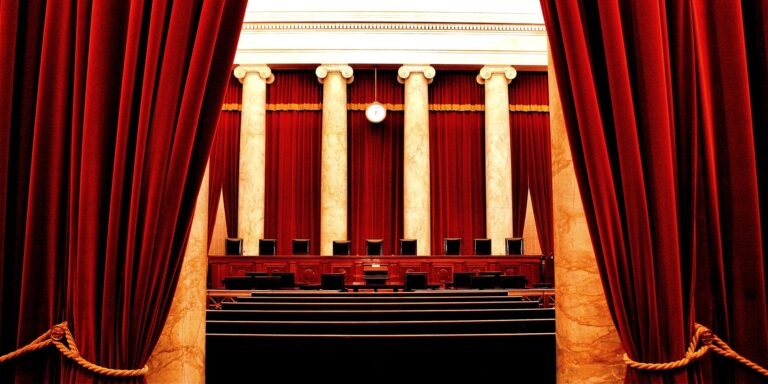The United States stands at a moral and spiritual crossroads. In the coming weeks, the Supreme Court will hear a series of cases that touch on the core of religious liberty, the sanctity of life, the role of the family, and the foundations of truth. These are not merely legal disputes; they represent deep spiritual struggles for the heart and direction of the nation.
This pivotal season comes amid a rising tide of legal challenges concerning the boundaries of church and state, many of which have been brought by conservative Christian legal organizations committed to upholding biblical values in a rapidly shifting culture.
Sacred Charity Under Review
On March 31, the Supreme Court will hear Catholic Charities Bureau Inc. v. Wisconsin Labor and Industry Review Commission, a case centered on the definition of religious work. The state of Wisconsin denied Catholic Charities an exemption from unemployment taxes, arguing that its charitable activities were not religious enough to warrant such status. Though the organization is motivated by Christian faith, the state determined its work to be primarily secular because it did not include overt proselytizing.
Many religious organizations have submitted amicus briefs in support of Catholic Charities, contending that the state should not be in the position of deciding what qualifies as “religious” work. Among these supporters are the National Association of Evangelicals, the United States Conference of Catholic Bishops, the Evangelical Council for Financial Accountability, and numerous Christian foundations.
One brief warned that such state interference would require ministries to prove their religious bona fides by distributing gospel tracts or mandating chapel attendance, thus turning faith-based service into a legal performance rather than a spiritual calling.
A Fight for Life and Conscience
On April 2, the Court will hear Kerr v. Planned Parenthood South Atlantic, a case involving South Carolina’s decision to cut Medicaid funding to clinics associated with abortion services, even when offering non-abortion care. Governor Henry McMaster stated that public funds should not support any facility that contributes to the practice of abortion, aligning his stance with a pro-life conviction.
Planned Parenthood and a Medicaid patient challenged the policy, claiming the right to choose from any qualified provider. In response, pro-family organizations have defended the state’s restriction, asserting the necessity of protecting life and preventing government complicity in abortion-related practices.
Parental Rights and Educational Integrity
On April 22, the Court will hear Mahmoud v. Taylor, a case brought by parents in Montgomery County, Maryland, who object to the removal of opt-out options for lessons containing LGBTQ-inclusive material. The parents argue that their constitutional right to raise children according to religious convictions is being violated.
Dozens of evangelical and conservative organizations, including the Ethics and Religious Liberty Commission of the Southern Baptist Convention, have filed briefs supporting the plaintiffs. These briefs contend that forcing young students to accept ideological views on gender and sexuality without accommodation for religious beliefs undermines both parental authority and religious freedom.
One brief stated that “the right of parents to transmit their religious faith to their children is one of the ancient landmarks of law,” and warned that without such rights, religion itself cannot be passed to future generations.
Faith and Public Education
Later in April, the Court will hear Oklahoma Statewide Charter School Board v. Drummond, a landmark case regarding public funding for religious charter schools. Oklahoma’s approval of St. Isidore of Seville Virtual Charter School, a Catholic institution, has sparked controversy as the first tax-funded religious charter school in the nation.
The state’s attorney general filed suit, claiming the decision violates Oklahoma’s constitution, which requires public schools to remain free from sectarian influence. In contrast, conservative Christian organizations such as Focus on the Family and Alliance Defending Freedom argue that denying religious schools equal opportunity constitutes viewpoint discrimination.
Education policy in Oklahoma has already become a battleground, with recent initiatives mandating the display of Bibles in public classrooms and promoting contested narratives about American history and elections.
Guarding the Innocent
The Supreme Court has already heard oral arguments in Free Speech Coalition, Inc. v. Paxton, a case challenging a Texas law that requires online pornography viewers to verify their age. The law, aimed at protecting minors, has received support from several evangelical groups, including the Southern Baptists of Texas Convention and the Baptist General Convention of Texas.
While free speech advocates argue the law imposes undue burdens on adults, Christian organizations maintain that the state has a compelling interest in shielding children from sexually explicit material that corrodes moral character and fosters addiction.
Gender, Medicine, and Moral Clarity
In United States v. Skrmetti, the Court will rule on a Tennessee law that restricts transgender medical treatments for minors. The legislation asserts that medical interventions designed to alter a minor’s perceived gender identity are inconsistent with the state’s responsibility to safeguard youth.
Conservative legal and religious groups have endorsed the law, pointing to the growing influence of “gender ideology” in medicine, education, and culture. A brief from the Ethics and Public Policy Center described the trend as one that threatens religious liberty, parental rights, and public health.
Although the Biden administration opposes the law, arguing that it violates constitutional protections, the Court’s decision may set a precedent for similar legislation in numerous other states.
Religious Counseling and Free Speech
The Court has also agreed to hear Chiles v. Salazar, a case brought by a Christian counselor in Colorado challenging the state’s ban on so-called “conversion therapy.” The counselor argues that her right to offer biblically grounded guidance to those seeking change in their sexual orientation is protected under the First Amendment.
Though mainstream medical associations have discredited conversion therapy, some faith-based counselors view it as a legitimate spiritual practice. The counselor is represented by Alliance Defending Freedom, which has previously secured high-profile religious liberty victories before the Court.
Critics argue that the case was manufactured to provoke a legal ruling favorable to conservative religious views, even though the plaintiff allegedly suffered no material harm.
The spiritual implications of these cases are profound. Each ruling has the potential to either uphold or undermine the biblical principles upon which the nation was founded. These legal disputes represent more than politics—they reveal the moral condition of the culture.
In response, Christian leaders across the country have called for prayer, repentance, and bold witness as the future of religious liberty, the protection of children, the authority of parents, and the dignity of human life now hang in the balance.




